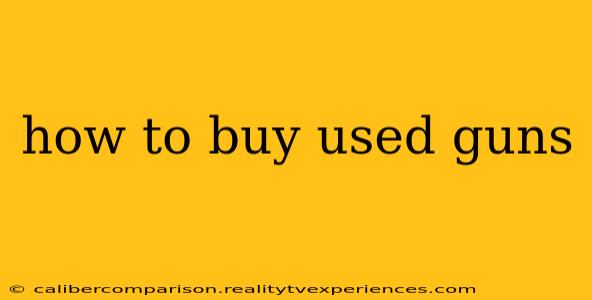Buying a used gun can be a great way to save money and find a firearm that fits your needs. However, navigating the process requires careful attention to legal requirements and safety precautions. This comprehensive guide will walk you through every step, ensuring a smooth and secure transaction.
Understanding the Legalities of Buying Used Guns
Before you even start looking at used firearms, it's crucial to understand the laws in your state and locality. Gun laws vary significantly across different jurisdictions, and failing to comply can lead to serious legal consequences. Key aspects to research include:
- Background checks: Most states require background checks for all firearm transfers, including private sales of used guns. Familiarize yourself with your state's specific requirements regarding licensed dealers and the completion of a background check form (often Form 4473).
- Waiting periods: Some states mandate waiting periods between the purchase and transfer of a firearm. Understanding these timelines is critical to avoid delays or potential legal issues.
- Prohibited persons: Certain individuals are legally prohibited from owning firearms. This includes convicted felons, individuals with specific mental health conditions, and those subject to restraining orders. Understanding these restrictions is paramount.
- Registration requirements: Some states require the registration of firearms. Check if your state has such regulations and what documentation is needed.
- Types of firearms allowed: Restrictions may exist on certain types of firearms, like fully automatic weapons or certain high-capacity magazines. Be aware of any limitations in your area.
Finding Reputable Sellers of Used Guns
Finding a reliable seller is as important as understanding the law. Here are some avenues to explore:
- Licensed gun dealers: While they might not always have the lowest prices, licensed dealers offer a degree of security. They are subject to regulations and are more likely to have properly inspected firearms.
- Gun shows: Gun shows can offer a wide selection of used firearms, but it's essential to exercise caution. Thoroughly inspect any firearm before purchase and be aware that not all sellers at gun shows are licensed dealers.
- Online marketplaces: Online platforms like GunBroker.com can connect you with sellers, but it's crucial to verify the seller's legitimacy and exercise caution when conducting transactions online. Always prioritize meeting in person to inspect the firearm and complete the transfer safely.
- Private sellers: Buying from private sellers can sometimes lead to better deals, but it necessitates extra diligence in verifying the seller's credentials and the firearm's legality.
Tips for Finding Trustworthy Sellers:
- Check references: If possible, ask for references from previous buyers.
- Meet in a public place: Always meet in a well-lit, public location for transactions.
- Inspect the firearm thoroughly: Never buy a firearm without a thorough inspection. Look for any signs of damage, wear, or modifications.
Inspecting a Used Gun Before Purchase
Careful inspection is crucial to ensure the firearm is safe and functional. Here's what to look for:
- Mechanical condition: Check for any signs of wear and tear, rust, or damage to the barrel, action, and other components.
- Functioning mechanisms: Cycle the action (if possible), check the trigger pull, and ensure all parts move smoothly.
- Bore condition: Inspect the barrel's interior for any damage or pitting.
- Serial number: Verify the serial number against any available records to ensure it's not stolen or reported lost.
- Documentation: Request any available documentation, such as the original bill of sale or proof of ownership.
Completing the Purchase Safely and Legally
Once you've found a firearm you want to purchase and have completed your inspection, ensure you follow these steps:
- Background check: Complete the necessary background check through a licensed dealer or according to your state's regulations.
- Payment: Use a secure method of payment, such as a cashier's check or money order. Avoid cash transactions if possible.
- Transfer of ownership: Follow all legal requirements for transferring ownership of the firearm, including any required documentation.
- Safe handling: Always handle the firearm safely and responsibly.
Post-Purchase Responsibilities
After purchasing a used gun, remember:
- Proper storage: Store your firearm securely and safely to prevent unauthorized access.
- Regular maintenance: Clean and maintain your firearm regularly to ensure its proper functioning and longevity.
- Safe handling practices: Always practice safe gun handling, even when at home.
Buying a used gun requires careful planning, legal awareness, and a commitment to safety. By following this guide, you can make an informed decision and complete the process legally and responsibly. Remember to always check your local and state laws before purchasing any firearm. This information is for guidance only and should not be considered legal advice. Consult with legal professionals and firearm experts for personalized guidance.

